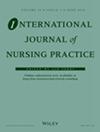Perceived Organizational Support as a Factor in Managing Work–Family Conflict and Enhancing Occupational Well-Being: Findings From Iranian Nurses
Abstract
Aims
The purpose of this study is to determine the relationship between organizational support, work–family conflict and occupational well-being in nurses.
Background
The sensitivities and problems in the nursing profession may lead to conflicts between work and family. The available solution to moderate this conflict is the organizational support available in hospitals, which can ultimately lead to job well-being in the nurses' work environments.
Methods
In this cross-sectional study, 291 nurses from four hospitals in the Iranian province of East Mazandaran were interviewed between November and January 2022 using the well-being at work scale (WBWS), the work–family conflict scale, the family–work conflict scale and the perceived organizational support (POS) questionnaire. Descriptive analysis, independent t-tests, analysis of variance, and linear regression were performed for data analysis.
Results
The overall mean scores of nurses' organizational support, work–family conflict, and occupational well-being were 16.70 ± 5.10, 29.62 ± 7.6 and 75.22 ± 17.81, respectively. In addition, organizational support was negatively correlated with work–family conflict (B = −0.25, p < 0.003), and by increasing one score of organizational support, the conflict score decreased by 0.25. Organizational support was positively correlated with occupational well-being (B = 0.81, p < 0.001).
Conclusion
Employees who are supported by their organization are more likely to experience higher levels of well-being, which may reduce conflict in both the home and the workplace. These findings are valuable to hospitals because they can improve the quality of care provided by nurses.


 求助内容:
求助内容: 应助结果提醒方式:
应助结果提醒方式:


